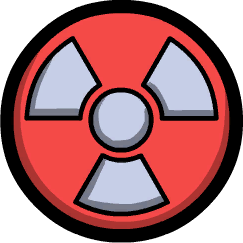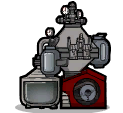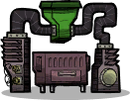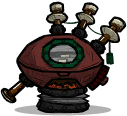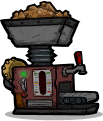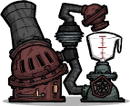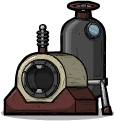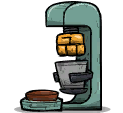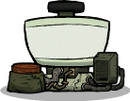Kiln
Kiln is a Refinement Building, which serves the purpose of refining Coal into Refined Carbon and Clay into Ceramic.
Recipes
Materials are produced at a temperature of 80 °C.
| Input | Output |
|---|---|
| 125 kg |
100 kg |
| 100 kg |
50 kg |
| 100 kg |
100 kg |
Crafting requires 40 seconds, but does not require duplicant operation. Except for Wood, these recipes are comparable to the natural turning points - coal heated to 279.9 °C will convert 100% of its mass to a solid tile of refined carbon, while clay at 929.9 °C will convert similarly to ceramic. However, the produced solid tile must be mined for a 50% mass loss, even if the heated clay or coal was already debris; thus, the kiln is more efficient in general.
Heat economy
Kiln can be run as net heat negative, due to the lower mass of outputs. It requires feeding it a fuel above a certain temperature:
- For refined carbon; HTC output/input ratio is 0.8 and threshold temperature of coal is around 9.60+ °C
- With coal at 80 °C, heat consumption will be at 20%, destroying 6248.41 kDTU.
- For ceramic; HTC output/input ratio is 0.77 and threshold temperature of all inputs is around -2.68+ °C
- With all inputs at 80 °C, heat consumption will be at 23%, destroying 9073.61 kDTU.
In theory, output can be used to make kilns self-cooling down to 80 °C, but in practice this is unnecessary: kilns have no overheat temperature. A kiln only exchanges heat with its surrounding gas, not with the tiles it stands on, its contents, the wire connecting it or the Duplicant delivering materials to it. As such, if placed in vacuum, it can be used to achieve high temperatures without using rocket exhaust gases or late-game materials - which can be used for a significant boost to Glass or Petroleum production efficiency, to heat solid clay or coal tiles into ceramic or refined carbon directly (sidestepping the 50% loss from cooking debris), or as a source of Liquid Steel for a wide variety of endgame high-temperature processes.
Use with Steam Turbines
As kilns require no Duplicant labour, they can be placed in sealed Steam rooms and supplied using Auto-Sweepers and Conveyor Rail systems. A kiln producing Refined Carbon will produce a total of 160 kDTU from 125 kg of Coal every eight seconds, which a Steam Turbine will convert into roughly 155 joules of usable power (or about 19.4 W per kiln).
Due to the nature of kiln heat deletion, this only works when the input coal temperature is above 125 °C, assuming that the input is allowed to exchange heat with the steam. As neither auto-sweepers nor kilns exchange heat with their contents, colder coal can be used, but it must be isolated from the steam before being loaded - the simplest way to do this is to remove a bottom corner from the steam room, and store coal in a vacuum in that cell. As auto-sweepers can reach through diagonal gaps, the coal can still be loaded, but it will not exchange heat with the steam.
As a means of power generation, this is significantly less efficient per unit coal than a Coal Generator (~1.24 J/kg vs 600 J/kg), requires more space, and does not nearly offset the power requirements of the automation needed (even given that it only runs for a small part of the cycle). However, since it's generally necessary to run kilns anyway, placing them in steam rooms will maximise resource returns unless their heat is wanted for something else (e.g. Liquid Steel).
Tips
- It can be fully automated with Auto-Sweeper.
- Kiln has no overheat temperature. It can be used to refine Metal Ores into Refined Metals.
Trivia
- Kiln's sprite resembles the traditional Scottish instrument: the bagpipes.
- The sound that the Kiln produces when its crafting also distantly sounds like a bagpipe.
History
- U50-581979: Kiln now has a progress bar.
















